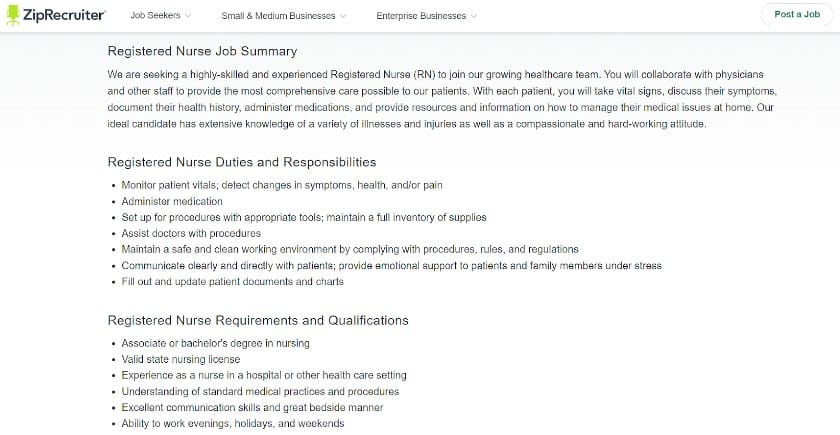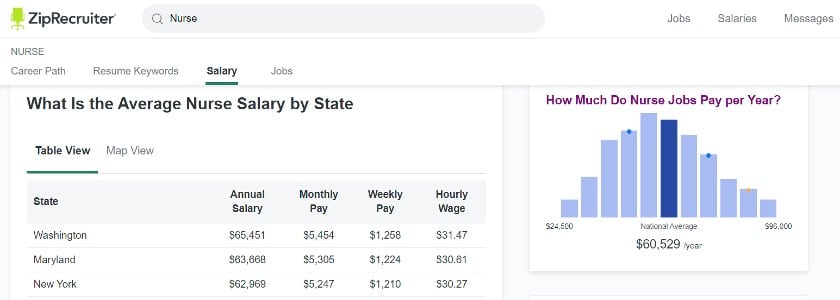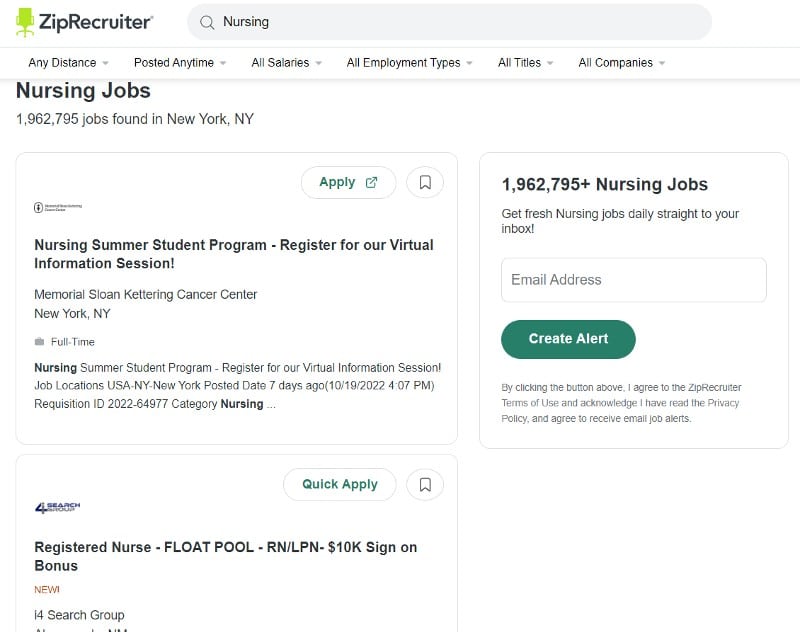Recruiting skilled nurses has become increasingly difficult. Whether you run a hospital, nursing home, or other healthcare facility, you need to hire nurses who can provide the highest level of care to your patients. Make the process easier by first determining exactly what type of nurse you need and then considering best practices along each step of the hiring process (from creating your job description and job ad to reviewing and interviewing applicants to contacting references and conducting a background check). Read on for our seven steps on how to recruit nurses.
If you’re looking for the easiest method, ZipRecruiter makes recruiting nurses a seamless experience. You can get help crafting an effective job description and start out posting your nurse job ad on multiple job boards at once, for free!
Step 1: Determine the Type of Nurse You Need
To figure out the type of nurse you need, start by listing the core duties of the job. Be detailed about the work you need to be completed. This will point you in the right direction regarding the type of nurse you need to hire, of which there are many:
- ER Nurse
- Charge Nurse
- Staff Nurse
- Home Health Nurse
- Neonatal Nurse
- Nurse Educator
- Nurse Practitioner
- Licensed Practical Nurse
- Licensed Vocational Nurse
- Nurse Case Manager
- School Nurse
- Registered Nurse
There are dozens more types of nurses you could choose from, but it all depends on the work you need to have done. Some skills you should look for, no matter what type of nurse you’re hiring, include:
- Exceptional patient care
- General medical knowledge
- Ability to check and monitor patient’s vital signs
- Understanding of safety protocols
- Excellent communication skills
- Empathy
- Technology skills
Make sure you’re clear about the type of employee you want to hire, which may include full time, part time, seasonal, or temporary.
Step 2: Create a Nurse-specific Job Description
It is a smart idea to create a job description before hiring. When writing your job description, you’ll want to include keywords that will help nurse candidates find your job when they’re searching. Include your job title, skills, and certifications, and use the word “nurse” frequently.

ZipRecruiter offers a nursing job description sample template to help you create the best job ad.
You’ll also need to determine your salary for this position and include it as part of your job description. The amount you offer will depend on your company budget, the type of skill-level you require from the candidates, where your business is located, and the work you’ll need this person to do.

ZipRecruiter offers a salary comparison tool to help you determine the right wage for your state.
The more senior the nurse position, the more you’ll have to pay. Average nursing salaries can range a great deal, from under $60,000 to well into the six figures—which is why it’s important to do market research and make sure you’re paying a fair and competitive salary. For the easiest way to handle your market research, use our recommended salary comparison tools.
Step 3: Post Job Ad & Review Applicants
Your job ad will include your job description, but it also needs to sell your company. Discuss the tools and software you offer to help nurses do their jobs well. Talk about career advancement opportunities within your organization. Mention work-life balance, time off, mental health counseling benefits, and other self-care initiatives your company offers. Nurses spend their days and nights caring for other people—they need the same in return.

ZipRecruiter shows potential candidates jobs in their area—giving you a larger reach to find that perfect candidate.
Once you’ve posted your job ad, you can expect to receive applicants on the same day. The more junior your nursing position is, the more likely you are to get lots of candidates quickly. This is why it’s key that you understand the must-haves for this position so you can quickly screen resumes and move applicants either to the interview pile or the decline pile. If you don’t want to pursue a candidate, mark their application as declined so they aren’t left in limbo.

ZipRecruiter allows you to invite qualified candidates to apply to your open positions, increasing your chances of finding the right candidate by five times.
Step 4: Conduct Interviews
One of the most crucial steps when you hire an employee is the interview. We recommend that you call each chosen applicant instead of emailing them to schedule an interview. While the latter can be more time-efficient, speaking with a candidate for even a few minutes will give you a good sense of their excitement for the job and their communication skills.

ZipRecruiter has a gallery of blog articles to help you during the interview process.
During each job interview, ask similar questions of the candidates so you can evaluate them evenly. Don’t overwhelm yourself with too many interviews, either—stick with fewer than a dozen candidates for the interview stage.
Here are some sample questions you may want to ask during your nurse interviews:
- Why did you decide to become a nurse?
- Describe a time you lost a patient and discuss how that affected your ability to do your job long term.
- What is your ideal work environment?
- How do you handle difficult patients?
- How do you handle colleague disagreements?
- How do you address questions from a patient’s family?
- Can you explain situations without using lots of medical terms?
- Describe a situation where a patient or family was unhappy with the care you provided.
- What do you do when you don’t know the answer?
Asking each of these questions gives you a good idea, even in a short interview, of the nurse applicant’s abilities in different situations. From the answers, you can then narrow down your list of top candidates to just two or three.
Step 5: Contact References
After you have narrowed down your list of nurse candidates, call their references. Ask for at least three supervisory references from each candidate at this stage to make sure you speak with at least two. You want to speak with a supervisor so you can learn more about the candidate’s work ethic and skills. Colleagues won’t be able to provide the same level of detailed information about the nurse’s abilities.
To help you make the most of your short conversation with a candidate’s references, here are a few sample questions:
- How long did the applicant work directly under your supervision?
- Would you work with this candidate again?
- What are their biggest strengths and weaknesses?
- What advice would you give to someone managing this person?
Step 6: Conduct Background Checks
Running a background check is not always necessary for new hires, but we recommend it for nurses. These are individuals who may be caring for vulnerable people and will need to keep lots of information confidential. Your company could be liable for any bad acts or mistakes made by a nurse you hire, so it’s best to run a background check before hiring them.
Make sure you get the nurse’s written permission before running a background check. The company you use to run the background check will be able to provide you with a form for the applicant to sign.
Step 7: Make an Offer
After speaking with all of the candidates, checking references, and reviewing your notes, it’s time to make a decision on which nurse you want to hire. No candidate will check every box, so don’t be discouraged if your top candidates don’t give you everything you want. Your best approach is to select the applicant who best matches the core duties of the nursing position you need to fill and make an official offer—use our free job offer template to document it.
When making an offer, you should also include details about any flexible schedules and/or benefits they will have. According to Nurse Deck, compensation and benefits are the two most important things nurses are looking for. Not only will you be able to attract top talent but it can reduce your turnover rate.
Here are some specific examples of great schedules, benefits, competitive compensation, and referral incentives that you can offer to attract and retain top nurses:
- Great schedules: Offer flexible scheduling options, such as three 12-hour shifts per week, night shifts, and weekend shifts. This will allow nurses to balance their work and personal lives.
- Benefits: Offer a comprehensive benefits package, including health insurance, dental insurance, vision insurance, paid time off, and retirement benefits.
- Competitive compensation: Offer a competitive salary and hourly rate. You can also offer bonuses and incentives for performance and retention.
- Referral incentives: Offer referral incentives to nurses who refer their friends and family members for jobs at your organization. This is a great way to attract qualified candidates and build your pipeline of talent.
All in all, trust your gut. You may not have spent a ton of time with every candidate, but you have had at least one long conversation with each of them. If you had a good rapport with a particular candidate, they may be the best cultural fit for your organization. You can teach some extra skills, but you can’t teach culture.
Tips to Consider When Hiring Nurses
When advertising open positions, the best way to attract the top nursing talent is to build your brand. Here’s a few tips to do so:
- Showcase a strong commitment to patient care. Nurses are passionate about providing excellent care to their patients. They want to work for a healthcare organization that shares their values. You can showcase your commitment to patient care by highlighting your patient satisfaction scores, awards and recognition, and employee testimonials.
- Offer a competitive salary and benefits package. Nurses are in high demand, so it is important to offer a competitive salary and benefits package. This includes things like a competitive hourly rate, health insurance, paid time off, and retirement benefits.
- Create a positive and supportive work environment. Nurses want to work in a positive and supportive work environment. You can create this environment by fostering a culture of respect, collaboration, and teamwork. You should also provide nurses with the resources and support they need to be successful in their roles.
- Provide opportunities for professional growth and development. Nurses want to work for a healthcare organization that invests in their professional growth and development. You can offer nurses opportunities to learn new skills, attend conferences, and advance their careers.
Bottom Line
Today’s job market is tough, especially in the healthcare industry, which is seeing a widely reported shortage of nurses. Although that makes recruiting nurses more challenging than it’s ever been, it doesn’t mean you will be unable to find the right match for your business. By keeping your job ad focused on the needs of the job candidate, their skills, and what your company offers, you can attract high-quality nurse candidates to your open position.